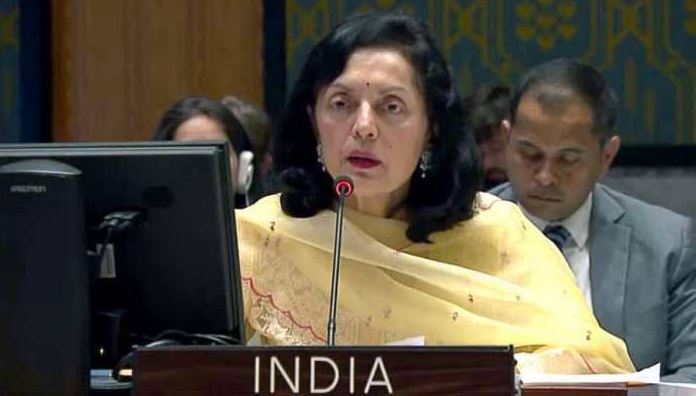United Nations: India has said it expects that the territory of Afghanistan should not be used for sheltering, training, or financing of terror acts, specifically terrorist individuals and entities proscribed by the UN Security Council.
“As a contiguous neighbour and long-standing partner of Afghanistan, and given our strong historical and civilisational linkages to the Afghan people, India has direct stakes in ensuring the return of peace and stability to the country,” India’s Permanent Representative to the UN Ambassador Ruchira Kamboj said Wednesday.
Speaking at the Security Council briefing on United Nations Assistance Mission in Afghanistan (UNAMA), Kamboj said the collective approach of the international community has been articulated in the Security Council Resolution 2593 of August 2021, which was adopted under India’s Presidency of the UNSC.
“In accordance with the Resolution, we expect that the territory of Afghanistan should not be used for sheltering, training, planning, or financing terrorist acts, specifically terrorist individuals and entities proscribed by the UN Security Council,” she said, adding that it also means acting against drug trafficking.
The resolution also outlines the need for the formation of a truly inclusive and representative government structure, which represents all sections of Afghan society, respects the rights of all Afghans, and ensures equal rights for women, girls, and members of minority groups, including their access to education.
India also voiced concern about increasing attempts towards removing women from public life in Afghanistan and called for women and minorities to be included in Afghanistan’s future and for their rights to be fully respected.
Special Representative of the Secretary-General (SRSG) and head of UNAMA told the Council that “Afghanistan under the Taliban remains the most repressive country in the world regarding women’s rights, and it has been distressing to witness their methodical, deliberate, and systematic efforts to push Afghan women and girls out of the public sphere.”
“Confining half of the country’s population to their homes in one of the world’s largest humanitarian and economic crises is a colossal act of national self-harm. It will condemn not only women and girls, but all Afghans, to poverty and aid dependency for generations to come. It will further isolate Afghanistan from its own citizens and from the rest of the world,” Otunbayeva said.
UNAMA has recorded an almost constant stream of discriminatory edicts and measures against women by the de facto authorities since August 2021.
In 2023, 13.8 million Afghan women and girls are in need of humanitarian assistance – yet the de facto authorities have undermined the unprecedented international aid effort by also banning women from working in non-governmental organisations, even though they are crucial to the delivery of life-saving help, the UN said.
Kamboj underlined that security and stability in Afghanistan will continue to be a priority for India and it will continue to speak out in support of the Afghan people. “Peace and stability in Afghanistan are critical imperatives that all of us also need to collectively strive for. India will continue to play its constructive role in the pursuit of this objective. The interests of the Afghan people will always continue to be at the core of all our efforts,” she said.
Noting that the humanitarian situation in Afghanistan remains deeply distressing, Kamboj said India has dispatched several shipments of humanitarian assistance to the country.
Reiterating India’s commitment to continue helping the Afghan people going forward, she said India has provided several shipments of humanitarian assistance including 40,000 MTs of wheat, 65 tonnes of medical aid and 28 tonnes of other relief material.
Recently, India also sent around 5,000 units of stationery items and winter clothing for primary school students of Habibia School in Kabul. In addition, India is also partnering with the United Nations Office on Drugs and Crime (UNODC) for the welfare and rehabilitation of the drug-user population in Afghanistan, especially among Afghan women.
Kamboj told the Council that India had actively taken part in finalising the draft of the current mandate of the UNAMA after the takeover of Kabul by the Taliban in 2021. “We are ready to work with the Secretary-General in his efforts to find progress in the situation in Afghanistan,” she said.
PTI
